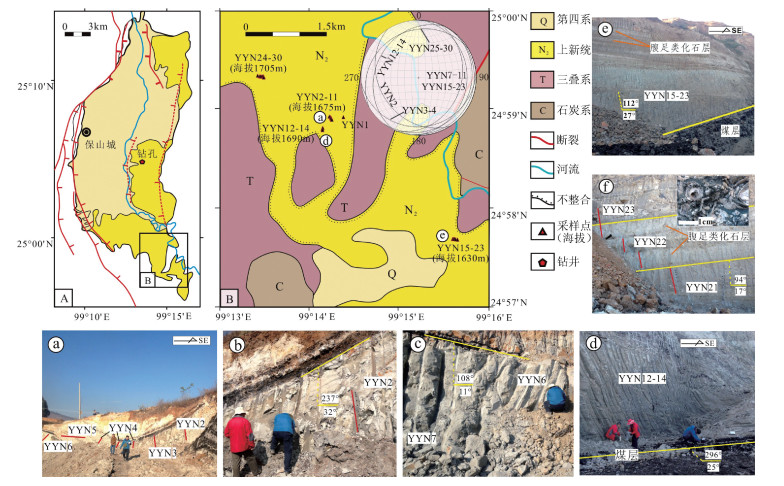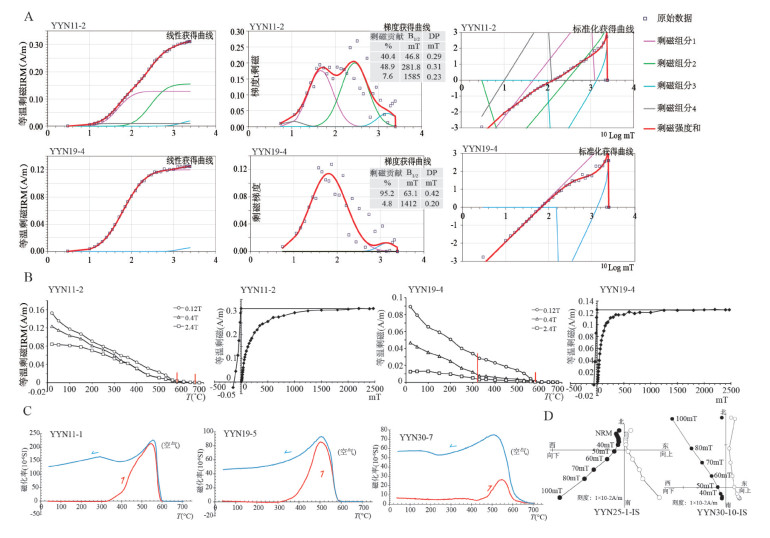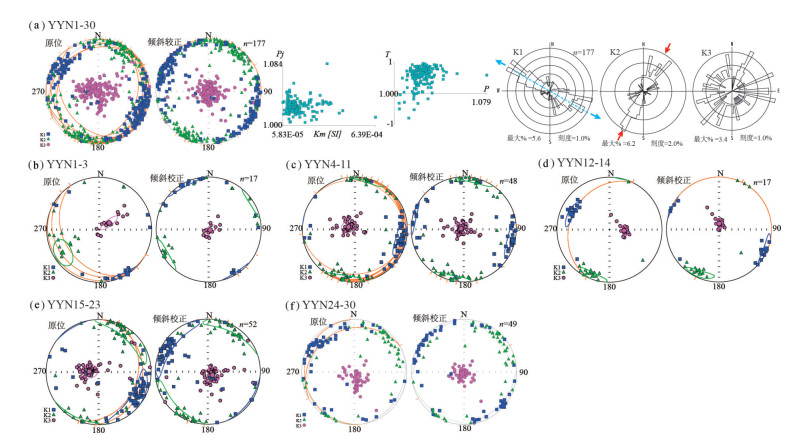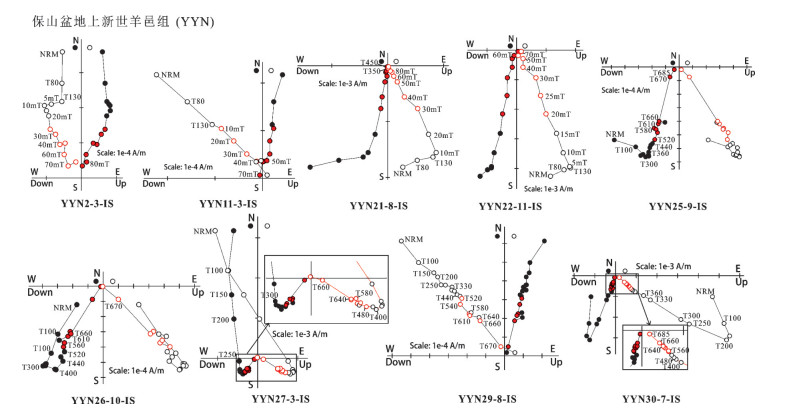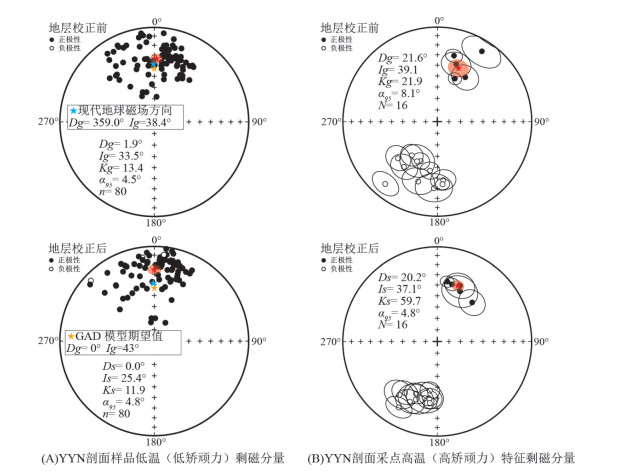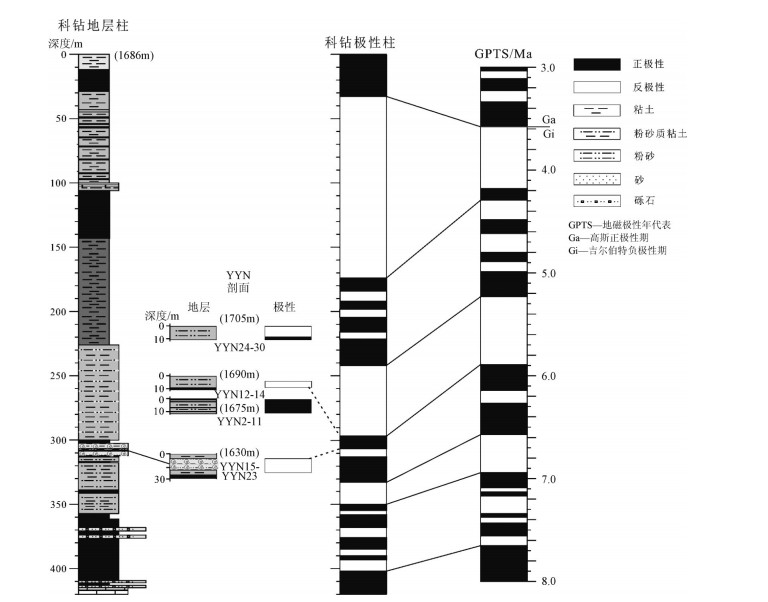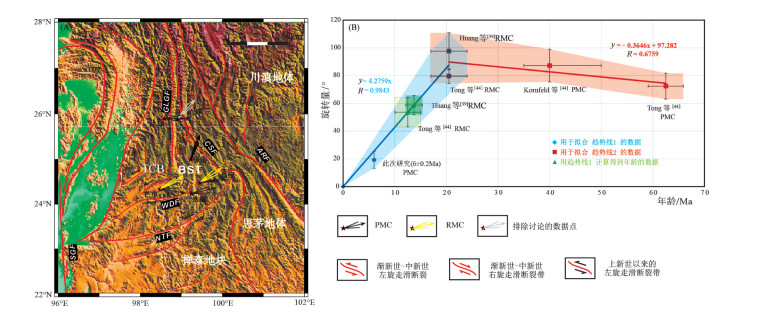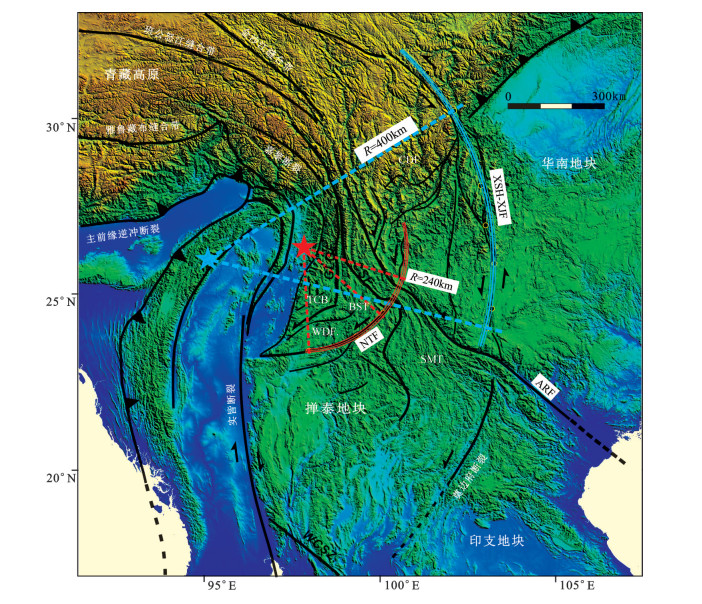Paleomagnetic study of Pliocene lacustrine strata in the Baoshan Basin at the southeastern edge of the Tibetan Plateau
-
摘要:
青藏高原东南缘受印度板块的持续挤压发生了强烈的陆内变形,前人的研究结果显示,保山地体中新世以来发生强烈的旋转变形,因此,在保山盆地东南缘上新世湖相沉积地层中采集了30个采点(约300块定向样品),其中160块样品分离出了特征剩磁分量,通过了褶皱检验和倒转检验,代表了沉积地层形成时的原生剩磁分量。地层产状校正后剩磁平均方向为:Ds/Is=20.2°/37.1°,Ks=59.7,α95=4.8°,N=16;对应古地磁极为:北纬67.9 °、东经205.7°,A95=2.6。通过与保山盆地东缘科研钻井磁性地层结果进行对比,可以确定羊邑剖面年代为6±0.2Ma;与10Ma东亚构造稳定区古地磁参考极对比发现,保山盆地发生了19.2°±6°的顺时针旋转,表明保山地体上新世以来平均顺时针旋转速率为3.2°±1.0°/Ma,如此快速的旋转速率印证了保山地体和腾冲地块古近纪和中新世古地磁研究所揭示的大角度顺时针旋转变形量。
Abstract:The southeastern part of the Tibetan Plateau has been strongly deformed by the penetration of the Indian Plate since the early Cenozoic. A large clockwise rotation of the Baoshan Terrane was reported through previous paleomagnetic studies. The authors therefore carried out a paleomagnetic study of the Pliocene lacustrine strata in the Baoshan Basin. A total of about 160 samples were treated by thermal demagnetization, and the characteristic remanent magnetism components (ChRMs) were isolated from these sam-ples along the Yangyi section (YYN), southeastern part of Baoshan Basin. Site-mean direction from the YYN is Ds/Is=20.21°/37.1°, Ks=59.7, α95=4.8°, N=16 after tilt correction, which give a paleomagnetic pole at 67.9°N, 205.7°E, A95=2.6°. The ChRM directions of the YYN section pass the fold and reversal tests, indicating that it represents the primary remanent magnetization during the formation of sedimentary rocks. The results reveal that the Baoshan Terrane has suffered from a clockwise rotation about 19.2°±6° relative to the paleomagnetic reference pole of East Asia since the Pliocene. Based on a comparison with the magnetostratigraphic results of the drilled core on the east margin of Baoshan basin, the authors hold that the age of the sampled strata of the YYN section is 6±0.2Ma, and a mean rotating rate of the Baoshan basin is about 3.2°±1.0°/Ma. This result is consistent with the large clockwise rotation of the Baoshan basin since the Miocene revealed by Oligocene and Miocene paleomagnetic studies of the Baoshan Terrane and Tengchong Block.
-
Keywords:
- southeastern Tibetan Plateau /
- Baoshan Terrane /
- paleomagnetism /
- Pliocene /
- rotation
-
致谢: 中国地质科学院地质力学研究所孙玉军副研究员和徐昊硕士在野外补采样中给予了帮助,国土资源部古地磁与古构造重建重点实验室其他成员在样品测试和分析中给予了指导和帮助,在此一并致以诚挚的谢意。
-
图 1 青藏高原东南缘研究区构造地质简图(A, 据参考文献[44]修改)和保山地体北部及邻区地质简图(B)
(采样点位于保山地体北部保山盆地羊邑组中)
CDF—川滇断块;SMT—思茅地体;BST—保山地体;TCB—腾冲地块;LMSF—龙门山断裂;XSH-XJF—鲜水河小江断裂;RRF—哀牢山-红河断裂;DBPF—奠边府断裂;WCSZ—王朝韧性剪切带;MFTF—主前缘逆冲断裂带Figure 1. Schematic tectonic geological map of the southeastern edge of Tibetan Plateau (A) and tectonic map of the North Baoshan Terrane (B)
图 9 保山地体以南汀河断裂带为旋转边界的旋转量构造简图
SMT—思茅地体;BST—保山地体;TCB—腾冲地块;CDF—川滇断块;ARF—哀牢山-红河断裂;NTF—南汀河断裂;WDF—畹町断裂;GLGF—高黎贡断裂带;CSF—崇山断裂带;WCSZ—王朝韧性剪切带;XSH-XJF—鲜小河小江断裂
Figure 9. Generalized tectonic map illustrating the rotation of the Baoshan Terrane around the fitted Euler pole (red star) along the Nantinghe fault system
表 1 保山地体上新世羊邑组YYN剖面各采点磁化率各向异性(AMS)测试结果
Table 1 Measurement results of anistropy magnetic susceptibility (AMS) of YYN section, Pliocene Yangyi Formation in Baoshan Terrane
采点 坐标N/E 走向/倾角/º n Km×10-6SI L F Pj T K1 K2 K3 q K1D/I(º) K2D/I(º) K3D/I(º) YYN2 24°59′/99°14′ 147/32 10 140 1.004 1.013 1.018 0.564 1.006 1.003 0.991 0.22 322.6/0.9 232.6/2.8 69.8/87.1 YYN3 24°59′/99°14′ 135/16 7 119 1.002 1.024 1.029 0.816 1.009 1.007 0.984 0.08 342/2.8 252/1.3 136.6/86.9 YYN4 24°59′/99°14′ 346/4 6 100 1.002 1.026 1.032 0.826 1.009 1.006 0.985 0.13 139.3/4.1 49.2/2.6 287.5/85.1 YYN5 24°59′/99°14′ 18/11 6 96 1.006 1.026 1.034 0.627 1.01 1.008 0.983 0.08 280.5/2.8 190.4/1.6 71.4/86.8 YYN6 24°59′/99°14′ 8/3 6 138 1.006 1.037 1.047 0.768 1.014 1.01 0.976 0.11 84.8/10.2 354.4/1.9 253.9/79.6 YYN7 24°59′/99°14′ 25/4 6 111 1.008 1.016 1.025 0.331 1.01 1.002 0.988 0.44 275.2/0.9 185.1/6.5 13.3/83.4 YYN8 24°59′/99°14′ 25/4 6 125 1.011 1.014 1.026 0.094 1.008 1.004 0.988 0.22 92.2/9.8 183/4.9 299.2/79.1 YYN9 24°59′/99°14′ 25/4 6 129 1.01 1.01 1.02 0.028 1.009 1 0.99 0.62 102.4/10.5 193/3.5 301.1/78.9 YYN10 24°59′/99°14′ 37/30 6 114 1.007 1.019 1.028 0.462 1.009 1.004 0.986 0.24 114.9/0.2 204.9/5.8 22.7/84.2 YYN11 24°59′/99°14′ 206/25 6 218 1.007 1.012 1.02 0.216 1.009 1.002 0.989 0.42 106.9/2 16.6/8.5 209.8/81.3 YYN12 24°59′/99°14′ 206/25 6 183 1.006 1.018 1.026 0.504 1.01 1.004 0.986 0.29 114/0.8 204.1/6.5 16.9/83.4 YYN13 24°59′/99°14′ 206/25 6 311 1.004 1.019 1.025 0.607 1.008 1.005 0.987 0.15 109.2/4 200.1/12.4 1.8/77 YYN14 24°59′/99°14′ 206/25 5 172 1.002 1.021 1.026 0.792 1.008 1.006 0.986 0.1 114.2/5.1 204.8/6.7 346.9/81.5 YYN15 24°58′/99°16′ 22/27 6 126 1.003 1.021 1.026 0.747 1.008 1.005 0.987 0.15 280/10.4 11/5.6 128.8/78.2 YYN16 24°58′/99°16′ 22/27 6 121 1.004 1.019 1.025 0.523 1.007 1.004 0.99 0.19 330.9/4.8 240.6/3.7 112.8/83.9 YYN17 24°58′/99°16′ 22/27 6 103 1.005 1.015 1.021 0.384 1.005 1.003 0.992 0.17 333/20 241.4/4.6 139.1/69.4 YYN18 24°58′/99°16′ 22/27 6 98 1.006 1.016 1.023 0.422 1.007 1.002 0.991 0.37 318.4/8 50.3/13.3 198.3/74.4 YYN19 24°58′/99°16′ 22/27 6 148 1.006 1.011 1.018 0.241 1.003 1.001 0.996 0.33 293.9/22.4 27.5/8.7 137.3/65.8 YYN20 24°58′/99°16′ 22/27 6 108 1.004 1.008 1.012 0.252 1.005 1.001 0.994 0.44 300.4/14.9 31.7/4.8 139.1/74.3 YYN21 24°58′/99°16′ 4/17 6 108 1.002 1.022 1.027 0.759 1.008 1.007 0.985 0.04 300.8/5.2 210.4/4.5 79.9/83.1 YYN22 24°58′/99°16′ 4/17 10 159 1.002 1.023 1.028 0.832 1.008 1.007 0.985 0.04 306.1/3.9 215.8/3.6 83.3/84.7 YYN24 24°59′/99°13′ 近水平 7 222 1.006 1.026 1.034 0.641 1.011 1.007 0.982 0.15 160.1/4.7 68.7/16.7 265.3/72.7 YYN25 24°59′/99°13′ 240/19 6 147 1.004 1.015 1.021 0.558 1.007 1.004 0.989 0.18 130.3/1.1 40.2/2.7 242.1/87.1 YYN26 24°59′/99°13′ 240/19 6 155 1.005 1.021 1.028 0.652 1.007 1.006 0.987 0.05 114.7/1.7 24.5/9.2 215.1/80.6 YYN27 24°59′/99°13′ 24019 6 136 1.004 1.016 1.022 0.595 1.006 1.003 0.991 0.22 111.8/1.2 21.8/2.4 228/87.3 YYN28 24°59′/99°13′ 24019 6 140 1.002 1.015 1.019 0.698 1.006 1.004 0.99 0.13 321.4/2.4 51.8/7.6 214.2/82.1 YYN29 24°59′/99°13′ 24019 6 277 1.006 1.023 1.032 0.571 1.012 1.005 0.983 0.27 301.2/3.5 31.4/3.7 167.6/84.9 YYN30 24°59′/99°13′ 近水平 6 307 1.004 1.023 1.029 0.699 1.01 1.006 0.984 0.17 292.6/3.1 22.7/1.6 139.8/86.5 YYN-ALL 177 1.54E-04 1.005 1.019 1.026 0.551 1.007 1.005 0.988 0.11 117.8/0 27.8/1.2 208.6/88.8 注:n为样品数;Km是平均磁化率;磁线理L=K1/K2;磁面理F=K2/K3;形态参数T=(2η2-η1-η3)/(η1-η3);η1=InK1,η2=InK2,η3=InK3,ηm=(η1+η2+η3)/3;各向异性度p=exp{sqrt[2×((η1-ηm)2+(η2-ηm)2+(η3-ηm)2]};f=90-K3;q=(K1-K2)/[(K1+K2)/2-K3] 表 2 保山地体北部保山盆地上新世羊邑组YYN剖面特征剩磁分量
Table 2 High-temperature magnetic components of the Pliocene Yangyi Formation of section YYN in the central part of the Baoshan Basin in the north part of Baoshan Terrane
采点 坐标 地层产状 n/N 地层校正前 地层校正后 Kg/Ks α95g/α95s 虚地磁极VGP N/E 走向/倾角(º) 偏角(º) 倾角(º) 偏角(º) 倾角(º) 纬度(°N) 经度(°E) A95(º) YYN2 24°58′52″/99°14′12″ 147/32 9/ 32.4 12.9 24.3 41.2 13.6 14.5 67.8 187.6 13.8 YYN4 24°58′52″/99°14′12″ 85/16 10/ 14.2 28.8 14.4 37.5 59.4/69 6.4/6.0 76.2 203.1 5.4 YYN7 24°58′52″/99°14′12″ 25/4 8/ 18.2 36.1 22.1 36.2 23.6/23.0 11.6/11.8 69 198.2 10.5 YYN11 24°58′52″/99°14′12″ 37/10 11/ 32.2 43.8 41.8 43.8 22.5 11.2 52.4 179 11.1 YYN12 24°58′44″/99°14′07″ 206/25 8/ 219.9 -15.1 210.3 -20.3 29.1/31.4 10.4/10.0 57.8 210.6 7.6 YYN17 24°57′33″/99°15′41″ 22/27 8/ 197.7 -33.9 215.4 -31.6 20.5 12.6 56.1 195.7 10.6 YYN20 24°57′33″/99°15′41″ 22/27 7/ 183 -30.2 200.3 -34.9 19.9 14 70.4 202.2 12.2 YYN21 24°57′33″/99°15′41″ 22/27 8/ 174.2 -37.8 187.8 -38.7 32.8 9.8 82.2 211.4 9 YYN22 24°57′33″/99°15′41″ 4/17 9/ 175.2 -33.9 186.9 -34.8 91.7 5.4 81.4 230.2 4.7 YYN24 24°59′20″/99°13′27″ 近水平 9/ 188.6 -46.4 188.6 -46.4 43.3 7.9 81.8 167.9 8.1 YYN25 24°59′20″/99°13′27″ 240/19 12/ 227 -42.6 212.2 -35.9 17.4 10.7 59.9 192.4 9.5 YYN26 24°59′20″/99°13′27″ 240/19 7/ 202.9 -52.6 188.6 -39.2 67.9 7.4 81.6 207 6.8 YYN27 24°59′20″/99°13′27″ 240/19 11/ 217.2 -53.1 202.2 -40.2 23.9 9.5 69.6 190.5 8.9 YYN28 24°59′20″/99°13′27″ 240/19 10/ 216.4 -40.2 204.5 -30.7 19.5 11.2 65.6 204.8 9.3 YYN29 24°59′20″/99°13′27″ 240/19 8/ 207.1 -51.1 192.5 -38.7 15.6 14.5 78.1 202.1 13.3 YYN30 24°59′20″/99°13′27″ 240/19 10/ 22.2 49.3 9.5 35.9 79.8 5.4 79.9 217.5 4.8 YYN剖面高温剩磁分量平均方向 /16 21.6 39.1 20.2 37.1 21.9/59.7 8.1/4.8 71 197.6 5 注:褶皱检验:99%置信度下通过褶皱检验[71],Kc/Ks=2.72,F(30, 30) =2.38;通过褶皱检验[69],DC slope:0.94±0.273;倒转检验:95%置信度下通过C类检验,平均γ=3.9 < 标准γ=10.6;n和N分别是古地磁采点内采样数和用于统计的采点数;k是统计精确度指数;α95和A95是平均方向95%置信度区间 表 3 保山地体和腾冲地块白垩纪—新生代古地磁数据
Table 3 The Cretaceous and Cenozoic paleomagnetic data obtained from the Baoshan Terrane and the Tengchong Terrane
研究区 坐标(N/E) 地层时代 N/n 观测值 古纬度 虚地磁极VGP 相对于东亚稳定区 磁化类型 参考文献 偏角(°) 倾角(°) α95 观测值(°N) 期望值(°N) 纬度(°N) 经度(°E) A95 (°) k 旋转量(°) 纬度运移量(°) 参考极 BST (永德) 24.2°/99.0° 古新世 5 76.9 17.8 10.4 9.1±5.6 17.3±4.1 15.6 186.2 8.3 86.3 72.4±9.4 8.2±7.4 60Ma 原生分量 [44] TCB (片马) 25.9°/98.8° 约40Ma 5/ 89.8 35.1 11.8 19.7±7.8 18.3±4.2 8.5 171.3 10.3 87.2±11.8 1.1±8.9 40Ma 原生分量 [43] BST (芒市) 24.3°/98.4° 中新世 6/ 99.7 35.2 11.3 19.4±7.5 19.4±3.1 -0.5 166.8 12.2 97.6±13.3 0.0±10.1 20Ma 重磁化分量 [39] BST (昌宁) 24.4°/99.3° 中新世 22/ 81.7 35.1 3.8 19.4±2.5 19.5±3.1 15.1 174.6 3.8 66.3 79.6±5.2 0.2±3.9 20Ma 重磁化分量 [44] BST (芒市) 24.3°/98.4° 中新世 6/ 60.9 32 5.9 17.4±3.7 19.0±3.1 33.1 182.9 5.8 58.7±6.9 2.1 ±5.3 20Ma 重磁化分量 [43] BST (昌宁) 24.4°/99.3° 中新世 /11 55.8 47.1 9 28.3±7.5 19.5±3.1 40.3 172 8.9 53.6±10.6 -8.8±7.5 20Ma 重磁化分量 [44] BST (六库) 26.0°/ 98.8° 约30Ma 12/ 42.3 47 7.8 28.2±6.5 20.2±2.8 52.7 175.7 8.1 39.9±9.7 -8.0±6.9 30Ma [39] BST (保山) 25.0°/99.2° 中新世末6±0.2Ma 16/ 20.2 37.1 4.8 20.9±5.0 22.7±2.6 71 197.6 5.0 55.4 19.2±6.0 1.8±4.5 l0Ma 原生分量 本次研究 东亚磁极移曲线[7] 0Ma 纬度=89.0° 经度=76.6° k=200.7 A95=0.4° 10Ma 纬度=87.5° 经度=257.3° k=154.8 A95=2.6° 20Ma 纬度=84.7° 经度=255.9° k=112.5 A95=3.1° 30Ma 纬度=83.9° 经度=259.6° k=106.7 A95=2.8° 40Ma 纬度=81.9° 经度=260.8° k=94.8 A95=4.2° 60Ma 纬度=81.9° 经度=247.5° k=57.4 A95=4.1° 80Ma 纬度=79.5° 经度=216.9° k=42.2 A95=3.4° 注:N/n分别代表了用于古地磁结果统计的采点数和样品数;k是统计精确度指数;α95和A95是平均方向 95%置信度区间。旋转量: 正负值分别代表了顺时针旋转和逆时针旋转;纬向运移:正负值分别指示了南向纬向运移和北向纬向运移 -
Klootwijk C T, Gee J S, Peirce J W, et al. An early India-Asia contact:Paleomagnetic constraints from Ninetyeast Ridge, ODP Leg 121[J]. Geology, 1992, 20(5):395-398. doi: 10.1130/0091-7613(1992)020<0395:AEIACP>2.3.CO;2
Najman Y, Appel E, Bown P, et al. Timing of India-Asia collision:Geological, biostratigraphic, and palaeomagnetic constraints[J]. Journal of Geophysical Research, 2010, 115(B12):1-70. doi: 10.1029/2010JB007673
Copley A, Avouac J, Royer J. India-Asia collision and the Cenozoic slowdown of the Indian plate:Implications for the forces driving plate motions[J]. Journal of Geophysical Research Atmospheres, 2010, 115(B3):181-192. doi: 10.1029/2009JB006634
Dupont-Nivet G, Lippert P C, Van Hinsbergen D J J, et al. Palaeolatitude and age of the Indo-Asia collision:palaeomagnetic constraints[J]. Geophysical Journal International, 2010, 182(3):1189-1198. doi: 10.1111/j.1365-246X.2010.04697.x
Van Hinsbergen D J J, Kapp P, Dupont-Nivet G, et al. Restoration of Cenozoic deformation in Asia and the size of Greater India[J]. Tectonics, 2011, 193(5):8-16. http://www.geo.uu.nl/~forth/publications/Hinsbergen_2011a.pdf
Sun Z, Pei J, Li H, et al. Palaeomagnetism of late Cretaceous sediments from southern Tibet:Evidence for the consistent palaeolatitudes of the southern margin of Eurasia prior to the collision with India[J]. Gondwana Research, 2012, 21(1):53-63. doi: 10.1016/j.gr.2011.08.003
Cogné J P, Besse J, Chen Y, et al. A new Late Cretaceous to Present APWP for Asia and its implications for paleomagnetic shallow inclinations in Central Asia and Cenozoic Eurasian plate deformation[J]. Geophysical Journal International, 2013, 192(3):1000-1024. doi: 10.1093/gji/ggs104
Yang T, Ma Y, Zhang S, et al. New insights into the India-Asia collision process from Cretaceous paleomagnetic and geochronologic results in the Lhasa terrane[J]. Gondwana Research, 2015, 28(2):625-641. doi: 10.1016/j.gr.2014.06.010
Ma Y, Yang T, Bian W, et al. Paleomagnetic and geochronologic results of latest Cretaceous lava flows from the Lhasa terrane and their tectonic implications[J]. Journal of Geophysical Research Solid Earth, 2017, 122(11):8786-8809. doi: 10.1002/jgrb.v122.11
Tapponnier P, Peltzer G, Dain A Y L, et al. Propagating extrusion tectonics in Asia:New insights from simple experiments with plasticine[J]. Geology, 1982, 10(10):611-616. https://www.researchgate.net/publication/239225686_Propagating_extrusion_tectonics_in_Asia_New_insights_from_simple_experiments_with_plasticine
Leloup P H, Lacassin R, Tapponnier P, et al. The Ailao Shan-Red River shear zone (Yunnan, China), Tertiary transform boundary of Indochina[J]. Tectonophysics, 1995, 251(1/4):3-10. http://www.geo.tu-freiberg.de/tektono/downloadfiles/Leloup%20et%20al.,%20Ailao%20Shan,%20Yunnan,%20Tectonoph%20%20251,%203-84,%201995.pdf
Wang E. Late cenozoic Xianshuihe/Xiaojiang and Red River fault systems of southwestern Sichuan and central Yunnan, China[J]. Special Paper of the Geological Society of America, 1998, 327:1-108. https://www.researchgate.net/publication/279409427_Late_Cenozoic_Xianshuihe-Xiaojiang_Red_River_and_Dali_Fault_Systems_of_Southwestern_Sichuan_and_Central_Yunnan_China
Wang E, Burchfiel B C. Late Cenozoic to Holocene deformation in southwestern Sichuan and adjacent Yunnan, China, and its role in formation of the southeastern part of the Tibetan Plateau[J]. Geological Society of America Bulletin, 2000, 112(3):413-423. doi: 10.1130/0016-7606(2000)112<413:LCTHDI>2.0.CO;2
Molnar P, Dayem K E. Major intracontinental strike-slip faults and contrasts in lithospheric strength[J]. Geosphere, 2010, 6(4):444-467. doi: 10.1130/GES00519.1
Funahara S, Nishiwaki N, Murata F, et al. Clockwise rotation of the Red River fault inferred from paleomagnetic study of Cretaceous rocks in the Shan-Thai-Malay block of Western Yunnan, China[J]. Earth & Planetary Science Letters, 1993, 117(1/2):29-42.
Chen H, Dobson J, Heller F, et al. Paleomagnetic evidence for clockwise rotation of the Simao region since the Cretaceous:A consequence of India-Asia collision[J]. Earth & Planetary Science Letters, 1995, 134(1/2):203-217.
Otofuji Y I, Liu Y, Yokoyam M, et al. Tectonic deformation of the southwestern part of the Yangtze craton inferred from paleomagnetism[J]. Earth & Planetary Science Letters, 1998, 156(1/2):47-60. https://www.deepdyve.com/lp/elsevier/tectonic-deformation-of-the-southwestern-part-of-the-yangtze-craton-MFwVXvc6ad
Yang Z, Sun Z, Ma X H, et al. Palaeomagnetic Study of the Early Tertiary on both Sides of the Red River Fault and Its Geological Implications[J]. Acta Geologica Sinica, 2001, 75:35-44. https://www.researchgate.net/publication/283915275_Palaeomagnetic_study_of_the_early_Tertiary_on_both_sides_of_the_red_river_fault_and_its_geological_implications
Sato K, Liu Y, Zhu Z, et al. Tertiary paleomagnetic data from northwestern Yunnan, China:further evidence for large clockwise rotation of the Indochina block and its tectonic implications[J]. Earth & Planetary Science Letters, 2001, 185(1/2):185-198. https://www.sciencedirect.com/science/article/pii/S0012821X00003770
Yoshioka S, Yu Y L, Sato K, et al. Paleomagnetic evidence for post-Cretaceous internal deformation of the Chuan Dian Fragment in the Yangtze block:a consequence of indentation of India into Asia[J]. Tectonophysics, 2003, 376(1):61-74. https://www.deepdyve.com/lp/elsevier/paleomagnetic-evidence-for-post-cretaceous-internal-deformation-of-the-Qsmxafe64E
Tamai M, Liu Y, Lu L Z, et al. Palaeomagnetic evidence for southward displacement of the Chuan Dian fragment of the Yangtze Block[J]. Geophysical Journal International, 2004, 158(1):297-309. doi: 10.1111/gji.2004.158.issue-1
Tanaka K, Mu C, Sato K, et al. Tectonic deformation around the eastern Himalayan syntaxis:Constraints from the Cretaceous paleomagnetic data of the Shan-Thai Block[J]. Geophysical Journal International, 2008, 175:713-728. doi: 10.1111/gji.2008.175.issue-2
Otofuji Y I, Yokoyama M, Kitada K, et al. Paleomagnetic versus GPS determined tectonic rotation around eastern Himalayan syntaxis in East Asia[J]. Journal of Asian Earth Sciences, 2010, 37(5/6):438-451. https://www.deepdyve.com/lp/elsevier/paleomagnetic-versus-gps-determined-tectonic-rotation-around-eastern-UdbaGQOHvG
Tong Y B, Yang Z, Zheng L D, et al. Internal crustal deformation in the northern part of Shan-Thai Block:New evidence from paleomagnetic results of Cretaceous and Paleogene redbeds[J]. Tectonophysics, 2013, 608(47):1138-1158. http://adsabs.harvard.edu/abs/2013Tectp.608.1138T
Tong Y B, Yang Z, Wang H, et al. The Cenozoic rotational extrusion of the Chuan Dian Fragment:New paleomagnetic results from Paleogene red-beds on the southeastern edge of the Tibetan Plateau[J]. Tectonophysics, 2015, 658:46-60. doi: 10.1016/j.tecto.2015.07.007
Wang H, Yang Z, Tong Y, et al. Palaeomagnetic results from Palaeogene red beds of the Chuan-Dian Fragment, southeastern margin of the Tibetan Plateau:implications for the displacement on the Xianshuihe-Xiaojiang fault systems[J]. International Geology Review, 2016, 58(11):1363-1381. doi: 10.1080/00206814.2016.1157710
Gao L, Yang Z, Tong Y, et al. Cenozoic clockwise rotation of the Chuan Dian Fragment, southeastern edge of the Tibetan Plateau:Evidence from a new paleomagnetic study[J]. Journal of Geody-namics, 2017, 112:46-57. doi: 10.1016/j.jog.2017.10.001
Shen Z K, Lü J, Wang M, et al. Contemporary crustal deformation around the southeast borderland of the Tibetan Plateau[J]. Journal of Geophysical Research Solid Earth, 2005, 110(B11409):1-17.
Gan W, Zhang P, Shen Z K, et al. Present-day crustal motion within the Tibetan Plateau inferred from GPS measurements[J]. Journal of Geophysical Research Solid Earth, 2007, 112(B8):582-596.
Molnar P, Tapponnier P. Cenozoic Tectonics of Asia:Effects of a Continental Collision:Features of recent continental tectonics in Asia can be interpreted as results of the India-Eurasia collision.[J]. Science, 1975, 189(4201):419-426. doi: 10.1126/science.189.4201.419
England P, Houseman G. Finite strain calculations of continental deformation:2. Comparison with the India-Asia Collision Zone[J]. Journal of Geophysical Research, 1986, 91(91):3664-3676. https://www.researchgate.net/publication/248790767_Finite_strain_calculations_of_continental_deformation_2_Comparison_with_the_India-Asia_Collision_Zone
Peltzer G, Tapponnier P, Gaudemer Y, et al. Offsets of Late Quaternary morphology, rate of slip, and recurrence of large earthquakes on the Chang Ma Fault (Gansu, China)[J]. Journal of Geophysical Research Solid Earth, 1988, 93(B7):7793-7812. doi: 10.1029/JB093iB07p07793
Bird P. Lateral extrusion of lower crust from under high topography in the isostatic limit[J]. Journal of Geophysical Research Solid Earth, 1991, 96(B6):10275-10286. doi: 10.1029/91JB00370
Clark M K, Royden L H. Topographic ooze:Building the eastern margin of Tibet by lower crustal flow[J]. Geology, 2000, 28(8):703-706. doi: 10.1130/0091-7613(2000)28<703:TOBTEM>2.0.CO;2
Royden L H, Burchfiel B C, King R W, et al. Surface Deformation and Lower Crustal Flow in Eastern Tibet[J]. Science, 1997, 276(5313):788-790. doi: 10.1126/science.276.5313.788
ErchieWang, Burchfiel B C. Interpretation of Cenozoic Tectonics in the Right-Lateral Accommodation Zone Between the Ailao Shan Shear Zone and the Eastern Himalayan Syntaxis[J]. International Geology Review, 1997, 39(3):191-219. doi: 10.1080/00206819709465267
Wu Z H, Long C, Fan T, et al. The arc rotational-shear active tectonic system on the southeastern margin of Tibetan Plateau and its dynamic characteristics and mechanism[J]. Geological Bulletin of China, 2015, 34(1):1-31.
Huang K, Opdyke N D. Paleomagnetism of Cretaceous to lower Tertiary rocks from southwestern Sichuan:a revisit[J]. Earth & Planetary Science Letters, 1992, 112(1/4):29-40. https://www.researchgate.net/publication/248411400_Paleomagnetism_of_Cretaceous_to_Lower_Tertiary_rocks_from_Southwestern_Sichuan_a_revisit
Huang K, Opdyke N D. Paleomagnetic results from Cretaceous and Jurassic rocks of South and Southwest Yunnan:evidence for large clockwise rotations in the Indochina and Shan-Thai-Malay terranes[J].Earth & PlanetaryScienceLetters, 1993, 117(3/4):507-524. https://www.researchgate.net/publication/248411556_Paleomagnetic_results_from_Cretaceous_and_Jurassic_rocks_of_South_and_Southwest_Yunnan_evidence_for_large_clockwise_rotations_in_the_Indochina_and_Shan-Thai-Malay_terranes
Yang Z Y, Besse J, Sutheetorn V, et al. Lower-Middle Jurassic paleomagnetic data from the Mae Sot area (Thailand):Paleogeographic evolution and deformation history of Southeastern Asia[J]. Earth & Planetary Science Letters, 1995, 136(3):325-341. https://www.researchgate.net/publication/248411730_Lower-Middle_Jurassic_paleomagnetic_data_from_the_Mae_Sot_area_Thailand_Paleogeographic_evolution_and_deformation_history_of_Southeastern_Asia
Gao L, Yang Z, Tong Y, et al. New paleomagnetic studies of Cretaceous and Miocene rocks from Jinggu, western Yunnan, China:Evidence for internal deformation of the Lanping-Simao Terrane[J]. Journal of Geodynamics, 2015, 89:39-59. doi: 10.1016/j.jog.2015.06.004
Tsuchiyama Y, Zaman H, Sotham S, et al. Paleomagnetism of Late Jurassic to Early Cretaceous red beds from the Cardamom Mountains, southwestern Cambodia:Tectonic deformation of the Indochina Peninsula[J]. Earth & Planetary Science Letters, 2016, 434(7):274-288. https://www.researchgate.net/publication/287199545_Paleomagnetism_of_Late_Jurassic_to_Early_Cretaceous_red_beds_from_the_Cardamom_Mountains_southwestern_Cambodia_Tectonic_deformation_of_the_Indochina_Peninsula
Kornfeld D, Eckert S, Appel E, et al. Cenozoic clockwise rotation of the Tengchong block, southeastern Tibetan Plateau:A paleomagneticandgeochronologicstudy[J].Tectonophysics, 2014, 628:105-122. doi: 10.1016/j.tecto.2014.04.032
Tong Y, Yang Z, Jing X, et al. New insights into the Cenozoic lateral extrusion of crustal blocks on the southeastern edge of Tibetan Plateau:Evidence from paleomagnetic results from Paleogene sedimentary strata of the Baoshan Terrane[J]. Tectonics, 2016, 35(11):2494-2514. doi: 10.1002/2016TC004221
卢海建, 王二七, 李仕虎, 等.青藏高原东南缘构造旋转变形分析:以四川盐源盆地古地磁研究为例[J].中国地质, 2015(5):1188-1201. http://www.cnki.com.cn/Article/CJFDTOTAL-DIZI201505002.htm Akciz S, Burchfiel B C, Crowley J L, et al. Geometry, kinematics, and regional significance of the Chong Shan shear zone, Eastern Himalayan Syntaxis, Yunnan, China[J]. Geosphere, 2008, 4(1):292. doi: 10.1130/GES00111.1
Xu Z, Ji S, Cai Z, et al. Kinematics and dynamics of the Namche Barwa Syntaxis, eastern Himalaya:Constraints from deformation, fabricsandgeochronology[J].GondwanaResearch, 2012, 21(1):19-36. https://www.deepdyve.com/lp/elsevier/kinematics-and-dynamics-of-the-namche-barwa-syntaxis-eastern-himalaya-Lgjea9bBbT
Wang Y, Fan W, Zhang Y, et al. Kinematics and 40Ar/39Ar geochronology of the Gaoligong and Chongshan shear systems, western Yunnan, China:Implications for early Oligocene tectonic extrusion of SE Asia[J]. Tectonophysics, 2006, 418(3/4):235-254.
Lin T H, Lo C H, Chung S L, et al. 40Ar/39Ar dating of the Jiali and Gaoligong shear zones:Implications for crustal deformation around the Eastern Himalayan Syntaxis[J]. Journal of Asian Earth Sciences, 2009, 34(5):674-685. doi: 10.1016/j.jseaes.2008.10.009
Wopfner H. Gondwana origin of the Baoshan and Tengchong terranes of west Yunnan[J]. Geological Society of London, 1996, 106(1):539-547. doi: 10.1144/GSL.SP.1996.106.01.34
戴苏兰, 赵泽江.云南保山盆地的形成与演化[J].矿物岩石, 1998, (s1):116-123. http://mall.cnki.net/magazine/Article/SYSD199802002.htm 张远志.云南省岩石地层[M].武汉:中国地质大学出版社, 1996. Thebault E, Finlay C, Group T I W. The International Geomagnetic Reference Field:the twelfth generatio[J]. Geophysical Journal International, 2010, 183(3):1216-1230. doi: 10.1111/j.1365-246X.2010.04804.x
Lowrie W. Identification of ferromagnetic minerals in a rock by co-ercivity and unblocking temperature properties[J]. Geophysical Research Letters, 1990, 17(2):159-162. doi: 10.1029/GL017i002p00159
Dunlop D J, Özdemir Ö. Rock Magnetism:Fundamentals and Frontiers[M]. Cambridge University Press, 1997.
Maher B A, Thompson R. Quaternary Climates, Environments and Magnetism[M]. Cambridge Univ. Press, 1999.
Hüsing S K, Dekkers M J, Franke C, et al. The Tortonian reference section at Monte dei Corvi (Italy):evidence for early remanence acquisition in greigite-bearing sediments[J]. Geophysical Journal International, 2009, 179(1):125-143. doi: 10.1111/gji.2009.179.issue-1
Passier H F, De Lange G J, Dekkers M J. Magnetic properties and geochemistry of the active oxidation front and the youngest sapropel in the eastern Mediterranean Sea[J]. Geophysical Journal International, 2001, 145(3):604-614. doi: 10.1046/j.0956-540x.2001.01394.x
Roberts A P, Chang L, Rowan C J, et al. Magnetic properties of sedimentary greigite (Fe3S4):An update[J]. Reviews of Geophysics, 2011, 49(1):RG1002(1-46). http://www.academia.edu/2539348/MAGNETIC_PROPERTIES_OF_SEDIMENTARY_GREIGITE_Fe3S4_AN_UPDATE
Duan Z, Liu Q, Gai C, et al. Magnetostratigraphic and environmental implications of greigite (Fe3S4) formation from Hole U1433A of the IODP Expedition 349, South China Sea[J]. Marine Geology, 2017, 394:82-97. doi: 10.1016/j.margeo.2017.02.008
Kruiver P P, Dekkers M J, Heslop D. Quantification of magnetic coercivity components by the analysis of acquisition curves of isothermal remanent magnetisation[J]. Earth & Planetary Science Letters, 2001, 189(3/4):269-276. https://www.deepdyve.com/lp/elsevier/quantification-of-magnetic-coercivity-components-by-the-analysis-of-T6wAQPEMFs
Heslop D, Dillon M. Unmixing magnetic remanence curves without a priori knowledge[J]. Geophysical Journal of the Royal Astronomical Society, 2007, 170(2):556-566. doi: 10.1111/gji.2007.170.issue-2
Tarling D H, Hrouda F. The magnetic anisotropy of rocks[M]. Chapman and Hall, London, 1993.
罗良, 贾东, 陈竹新, 等.川西北磁组构演化及其揭示的应变特征[J].地质通报, 2006, 25(11):1342-1348. doi: 10.3969/j.issn.1671-2552.2006.11.015 Luo L, Jia D, Li H, et al. Magnetic fabric investigation in the northwestern Sichuan Basin and its regional inference[J]. Physics of the Earth & Planetary Interiors, 2009, 173(1/2):103-114. https://www.doc88.com/p-6721222546522.html
Zijderveld A C. Demagnetization of rocks: Analysis of results[C]//Collinson D W, Creer K M, Runcorn S K. Methods in Paleomagnetism, Methods in Paleomagnetism. Elsevier, Amsterdam, 1967: 254-286.
Kirschvink J L. The least-squares line and plane and the analysis of palaeomagnetic data[J]. Geophysical Journal International, 1980, 62(3):699-718. doi: 10.1111/gji.1980.62.issue-3
Fisher R. Dispersion on a Sphere[J]. Proceedings of the Royal Society of London, 1953, 217(1130):295-305. doi: 10.1098/rspa.1953.0064
Enkin R J. A computer program package for analysis and presentation of paleomagnetic data[J]. Pacific Geoscience Centre, Geological Survey of Canada, 1994:1-16. doi: 10.2478/s11600-006-0016-9
Cogné J P. PaleoMac:A MacintoshTM application for treating paleomagnetic data and making plate reconstructions[J]. Geochemistry Geophysics Geosystems, 2003, 4(1):233-236. https://www.researchgate.net/publication/228535927_PaleoMac_A_MacintoshTM_application_for_treating_paleomagnetic_data_and_making_plate_reconstructions
Mcelhinny M W. Statistical Significance of the Fold Test in Palaeo-magnetism[J]. Geophysical Journal of the Royal Astronomical Society, 1964, 8(3):338-340.
Enkin R J. The direction-correction tilt test:an all-purpose tilt/fold test for paleomagnetic studies[J]. Earth & Planetary Science Letters, 2003, 212(1/2):151-166. https://www.deepdyve.com/lp/elsevier/the-direction-correction-tilt-test-an-all-purpose-tilt-fold-test-for-fW5BxTtg0A
Mcfadden P L, Mcelhinny M W. Classification of the reversal test in palaeomagnetism[J]. Geophysical Journal International, 1990, 103(3):725-729. doi: 10.1111/gji.1990.103.issue-3
汪彦, 彭军, 李凯军, 等.高分辨率层序地层学在保山盆地永铸街凸起构造-沉积演化中的应用[J].天然气地球科学, 2005, 16(6):741-746. http://www.wanfangdata.com.cn/details/detail.do?_type=perio&id=trqdqkx200506011 Kornfeld D, Eckert S, Appel E, et al. Clockwise rotation of the Baoshan Block due to southeastward tectonic escape of Tibetan crust since the Oligocene[J]. Geophysical Journal International, 2014, 197(1):149-163. doi: 10.1093/gji/ggu009
Spurlin M S, Yin A, Horton B K, et al. Structural evolution of the Yushu-Nangqian region and its relationship to syncollisional igneous activity, eastcentral Tibet[J]. Geological Society of America Bulletin, 2005, 117(9/10):1293-1317. http://www.researchgate.net/publication/235980451_Structural_evolution_of_the_Yushu-Nangqian_region_and_its_relationship_to_syn-collisional_igneous_activity_east-central_Tibet
Aikman A B, Harrison T M, Lin D. Evidence for Early (>44Ma) Himalayan Crustal Thickening, Tethyan Himalaya, southeastern Tibet[J]. Earth & Planetary Science Letters, 2008, 274(1/2):14-23.
Tong Y, Yang Z, Mao C, et al. Paleomagnetism of Eocene redbeds in the eastern part of the Qiangtang Terrane and its implications for uplift and southward crustal extrusion in the southeastern edge of the Tibetan Plateau[J]. Earth & Planetary Science Letters, 2017, 475:1-14
Tang M, Jing L Z, Hoke G D, et al. Paleoelevation reconstruction of the Paleocene-Eocene Gonjo basin, SE-central Tibet[J]. Tectonophysics, 2017, (712/713):170-181. http://www.sciencedirect.com/science/article/pii/S0040195117302019
Lan J B, Xu Y G, Yang Q J, et al.~40Ma OIB-type mafic magmatism in the Gaoligong belt:results of break-off between subducting Tethyan slab and Indian plate?[J]. Acta Petrologica Sinica, 2007, 23(6):1334-1346. http://en.cnki.com.cn/Article_en/CJFDTOTAL-YSXB200706009.htm
Yang Z, Hou Z, Yang Z, et al. Genesis of porphyries and tectonic controls on the Narigongma porphyry Mo(-Cu) deposit, southern Qinghai[J]. Acta Petrologica Sinica, 2008, 24(3):489-502. https://www.researchgate.net/publication/257941275_Genesis_of_porphyries_and_tectonic_controls_on_the_Narigongma_porphyry_Mo-Cu_deposit_Southern_Qinghai
Wang Q, Wyman D A, Li Z X, et al. Eocene north-south trending dikes in central Tibet:New constraints on the timing of east-west extension with implications for early plateau uplift?[J]. Earth & Planetary Science Letters, 2010, 298(1):205-216.
Sato K, Liu Y, Wang Y, et al. Paleomagnetic study of Cretaceous rocks from Pu'er, western Yunnan, China:Evidence of internal deformation of the Indochina block[J]. Earth & Planetary Science Letters, 2007, 258(1/2):1-15. http://www.sciencedirect.com/science/article/pii/S0012821X07000854
Li S H, Advokaat E L, Hinsbergen D J J V, et al. Paleomagnetic constraints on the Mesozoic-Cenozoic paleolatitudinal and rotational history of Indochina and South China:Review and updated kinematic reconstruction[J]. Earth-Science Reviews, 2017, 171:58-77. doi: 10.1016/j.earscirev.2017.05.007
仝亚博, 杨振宇, 王恒, 等.中国西南思茅地体中部白垩纪古地磁结果及陆内地壳变形特征[J].地球物理学报, 2014, 57(1):179-198. doi: 10.6038/cjg20140116 徐锡伟, 张培震, 闻学泽, 等.川西及其邻近地区活动构造基本特征与强震复发模型[J].地震地质, 2005, 27(3):446-461. http://www.wanfangdata.com.cn/details/detail.do?_type=perio&id=dzdz200503010 Socquet A, Pubellier M. Cenozoic deformation in western Yunnan (China-Myanmar border)[J]. Journal of Asian Earth Sciences, 2005, 24(4):495-515. doi: 10.1016/j.jseaes.2004.03.006
杨振宇, 王树兵, 仝亚博, 等. 青藏高原东南缘晚新生代年代地层及旋转变形过程的古地磁学限定(地质调查项目(12120114002301)成果报告). 2017.



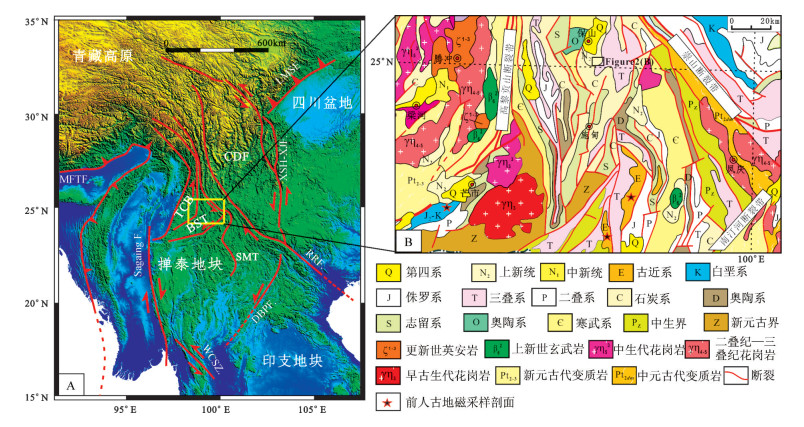
 下载:
下载:
